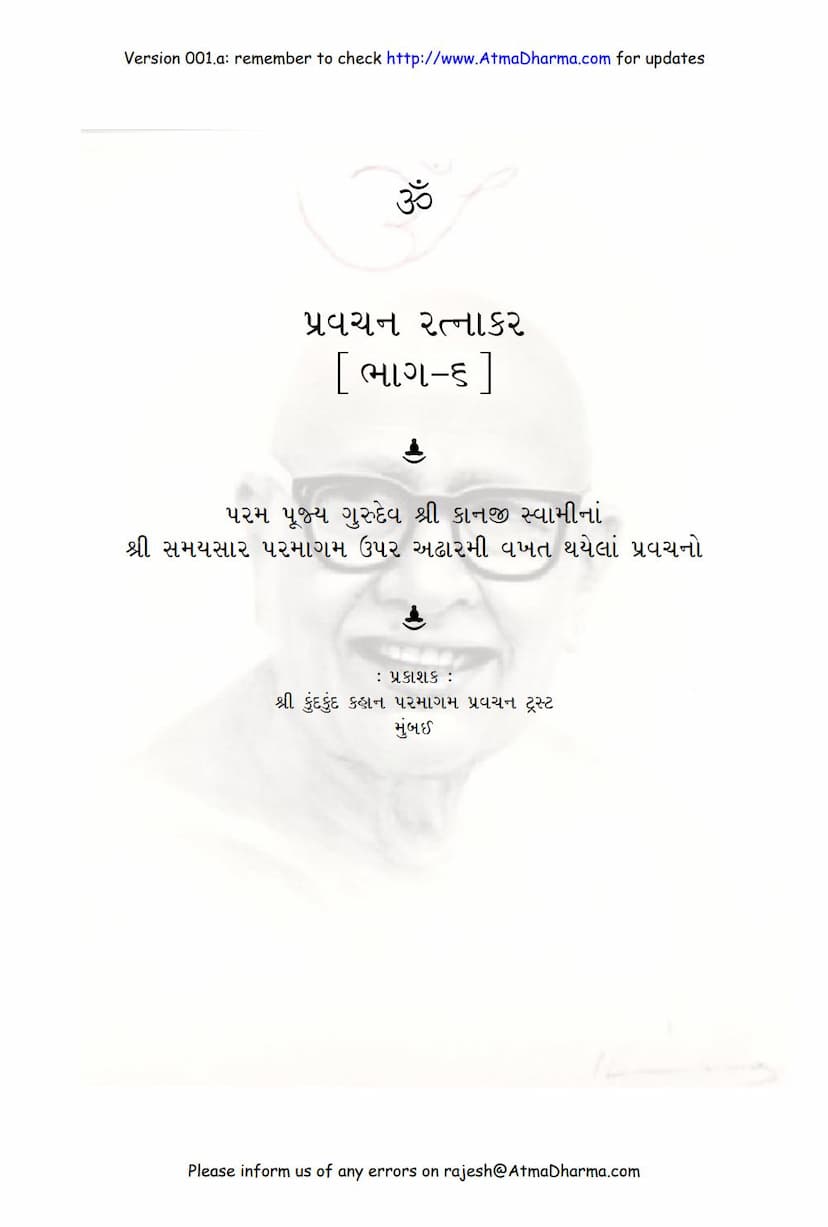Pravachana Ratnakar 06
Added to library: September 2, 2025

Summary
Certainly! Here's a comprehensive summary of the provided Jain text, "Pravachana Ratnakar 06" by Kanjiswami, based on the Gujarati text you've supplied. The summary focuses on the Jain philosophical concepts discussed in the text, particularly from the Samaysara.
Pravachana Ratnakar Part 06: A Summary
This volume, Pravachana Ratnakar Part 06, contains the eighteen discourses by the revered Gurudev Shri Kanjiswami on Acharya Kundakunda's Shri Samaysara Paramagama. The lectures were delivered between 1975 and 1977. Published by Shri Kundkund Kahana Paramagama Pravachan Trust, Mumbai, this text aims to illuminate the profound spiritual insights of Jainism, particularly the path to liberation as expounded in the Samaysara.
Core Themes and Concepts:
The essence of these discourses revolves around the teachings of Acharya Kunda-kunda, particularly from his seminal work, the Samaysara. The central theme is the attainment of the soul's inherent pure, omniscient, and blissful nature, which is obscured by deluded perceptions (mithyātva), passions (kashāyas), and the influx of karmic particles (āsravas). The discourses emphasize the ultimate reality of the soul's pure substance (dravya) and its pure accidental states (paryāyas) as the sole path to liberation (moksha).
Key Concepts Discussed:
-
The Nature of the Soul (Ātmā):
- The soul is described as pure, self-luminous, eternal, and inherently possessing infinite knowledge, perception, bliss, and power. It is contrasted with all other substances, including karmic particles and passions, which are considered non-soul (ajiva).
- The soul's true nature is consciousness (chaitanya) and bliss (ānanda). Its inherent state is described as nishkampa (unwavering), nirālambana (unsupported by external factors), and nishkama (passionless).
-
Ignorance (Ajñāna) and Ignorance-Driven Actions (Vibhāva):
- The soul's bondage and suffering stem from ignorance of its true nature and the consequent attachment and aversion (rāga-dveṣa) to worldly objects and passions.
- Actions driven by passions, whether seemingly virtuous (puṇya) or unvirtuous (pāpa), are ultimately considered ignorance-driven (ajñānamaya) and are the cause of bondage (bandha). They are described as "childish austerities" (bālatapa) and "childish vows" (bālavrata) when not accompanied by the right knowledge of the soul.
-
Right Knowledge (Samyak Jñāna) and the Path to Liberation (Moksha):
- The path to liberation is exclusively through the soul's self-realization, understanding its true nature as pure consciousness and bliss. This realization is achieved through right faith (samyakdarśana), right knowledge (samyakjñāna), and right conduct (samyakchāritra).
- These three are ultimately described as the manifestation of the soul's inherent nature, where knowledge itself becomes the path to liberation. The emphasis is on experiencing the soul's pure, self-luminous, and blissful consciousness.
-
Rejection of Ritualism and External Actions:
- The discourses strongly critique the reliance on external rituals, austerities (tapas), vows (vratas), and devotional practices (bhakti) as the primary means to liberation. While these might have a place in practical conduct, they are not the ultimate cause of liberation.
- The text argues that any action or mental state driven by passion (rāga), even seemingly virtuous ones like devotion or austerities, is a form of bondage if it is not rooted in the soul's self-knowledge and does not lead to the cessation of passions.
-
The Soul's Self-Sufficiency and Liberation:
- The soul is inherently free, pure, and blissful. It is not dependent on external factors or actions for its liberation. Liberation is achieved by recognizing and abiding in this inherent nature.
- The concept of "bhedavijñāna" (discrimination between the soul and non-soul) is highlighted as crucial. By understanding the soul's essence as distinct from karmic matter and passions, one can break the cycle of transmigration.
-
Critique of "Sons of Merit" (Puṇyavāna) and Ritualism:
- The discourses address the common misconception that performing virtuous deeds (puṇya) leads to liberation. Kanjiswami clarifies that while virtuous actions might lead to better worldly circumstances or even heavenly realms, they do not uproot the soul's ignorance and passions.
- The emphasis remains on realizing the soul's inherent purity, which transcends all dualities of merit and demerit, virtue and vice.
-
The True Nature of Knowledge (Jñāna):
- The text distinguishes between worldly knowledge (śruta-jñāna, etc.) and the soul's essential knowledge (svasṁvedana-jñāna). True knowledge, which leads to liberation, is the direct, self-experienced realization of the soul's pure nature.
- The soul's inherent nature is described as "jñāna-maya" (made of knowledge), "shuddha" (pure), "nitya" (eternal), "dhruva" (unwavering), and "nirvikāra" (passionless).
Key Principles Illustrated:
- Naya (Standpoints): The discourses often engage with the concept of naya, particularly the distinction between niścaya naya (ultimate truth, referring to the soul's essential nature) and vyavahāra naya (conventional truth, referring to worldly classifications and practices). While vyavahāra has a place in guiding towards niścaya, it is ultimately the niścaya realization that leads to liberation.
- Self-Realization: The ultimate goal is the direct experience of the soul's pure consciousness and bliss, free from all external influences and internal passions.
- The Impermanence of External Actions: External actions, however virtuous, are transient and do not alter the soul's eternal nature. True liberation lies in realizing the soul's unchanging essence.
In essence, Pravachana Ratnakar Part 06 serves as a guide to understanding the ultimate reality of the soul according to Jain philosophy, emphasizing self-knowledge, detachment from passions, and the unwavering pursuit of the soul's pure, liberated state as taught by the Tirthankaras and elaborated by revered Āchāryas like Kunda-kunda and Amritachandra.